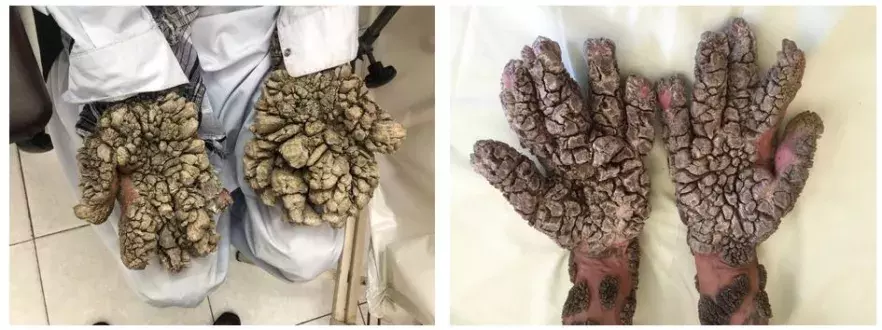Published on 02.07.2021
Vivien Béziat, who leads a team in the Human Genetics of Infectious Diseases laboratory headed by Prof. Jean-Laurent Casanova and Prof. Laurent Abel*, at Institut Imagine (AP-HP, Inserm, Université de Paris), located at Hôpital Necker-Enfants malades AP-HP, and at Rockefeller University in New York, has identified for the first time a genetic cause of this syndrome, as part of an international collaboration. This discovery was published on July 1, 2021 in the journal Cell.
In describing the mutation in question, the researchers also discovered that the gene responsible for the disease plays a much less important role than expected in the immune system, where it was thought to be indispensable.
A genetic mutation makes you more susceptible to skin papillomavirus
There are more than 200 human papillomaviruses (HPVs). Some of them cause benign skin lesions such as vulvar or plantar warts, others can cause cervical cancer. The Human Genetics of Infectious Diseases laboratory has focused on cutaneous HPVs, and has been working for several years to understand why a very few cases develop a severe form of these usually harmless infections.
In a publication in the journal Cell, the team of researcher Vivien Béziat in the Human Genetics of Infectious Diseases laboratory[1] reported an Iranian patient with tree-man syndrome, and two family members with a severe form of cutaneous HPV infection with a large number of warts on the hands and feet, but without having developed this syndrome. A common point was found in these three patients: a mutation of the CD28 gene. This gene normally plays a major role in the activation of T lymphocytes, the immune cells that destroy cells infected by a virus.
In these patients, the CD28 gene mutation prevents the immune system from recognizing the virus and triggering an appropriate response. The virus then proliferates in the keratinocytes, the cells that make up the skin's epidermis, and causes an uncontrolled multiplication of warts and/or skin horns. This is the first time that a genetic cause of the "tree man" syndrome has been identified.
The CD28 gene, central to resistance to certain cutaneous papillomaviruses, but not to the immune system
But by analyzing the CD28 mutation, another discovery was made by these researchers. The CD28 gene, until now considered as a pillar in the functioning of the immune system and the response of T lymphocytes, does not seem to have such a major role. Indeed, the three patients studied were exposed to several types of HPVs and many other pathogens in their medical history. However, they only developed severe reactions to HPV2 for the patient with tree-man syndrome, and to HPV4 for the two family members.
"These patients showed abnormally high susceptibility only to certain papillomaviruses of the gamma-HPV and alpha-HPV genus. Based on the work done over the last 30 years, we thought that a dysfunction of the CD28 gene would make patients sensitive to many infectious agents. However, even if their immune response is weakened, patients defend themselves well against other pathogens," explains Vivien Béziat, first author of the study. This discovery provides new insights into the understanding of genetic susceptibility to HPVs, and challenges the dogmas of T cell immune response.
Today, no treatment has been shown to be effective against "tree man" syndrome. A hematopoietic stem cell transplant to replace the patient's immune system is being considered. However, this heavy and expensive treatment is not easily accessible to populations living in less developed countries, who will develop very severe forms of the disease, notably due to lack of access to care. By advancing research, the team hopes to accelerate access to treatment for these patients.
Sources
Vivien Béziat et al.
Cell, 1er juillet 2021
[1] The International Laboratory of Human Genetics of Infectious Diseases is directed by Prof. Jean-Laurent Casanova and Prof. Laurent Abel. Jean-Laurent Casanova directs genetics and experimental immunology in both branches (Paris and New York), while Laurent Abel directs genetics and mathematical epidemiology in both branches.

